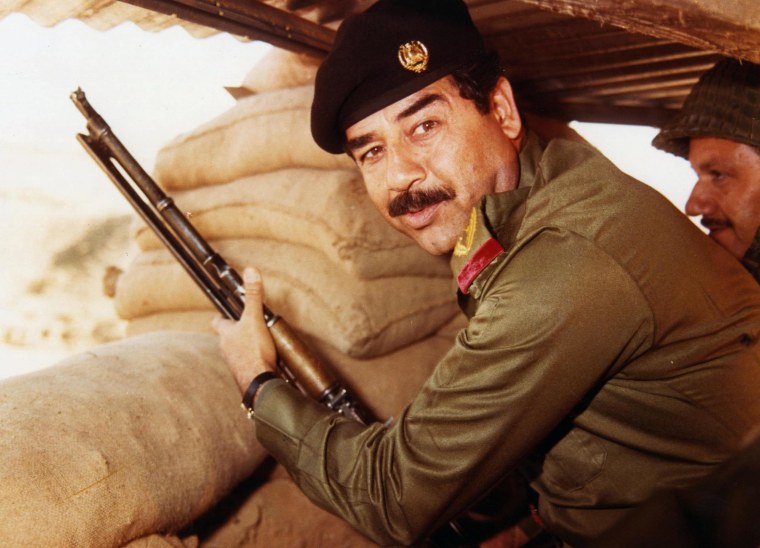Presumptive Republican nominee Donald Trump made headlines Tuesday night when he praised Saddam Hussein for his counterterrorism strategy while maintaining that the former Iraqi dictator was a "really bad guy."
"We shouldn't have destabilized Saddam Hussein, right?" Trump asked his supporters on Tuesday. "He was a bad guy, really bad guy, but you know what he did well? He killed terrorists. He did that so good."
The business mogul said that Hussein "didn't read them the rights, they didn't talk. They were terrorists, over." Once again, he dubbed Iraq the "Harvard for terrorism," declaring that the country was an Ivy League-caliber training ground for aspiring terrorist recruits. The deposed Iraqi leader was executed in 2006 for crimes during his rule.
This isn't the first time Trump has praised Hussein — or other dictators. His remarks are among several instances in which the billionaire candidate has offered praise for tyrannical leaders. Here are other authoritarians that Trump has praised:
Vladimir Putin
After Russian President Vladimir Putin praised Trump as "talented" and the "absolute leader" in the GOP race for the White House back in December, Trump said that "sure" he liked Putin's remarks about him.
"When people call you 'brilliant' it's always good, especially when the person heads up Russia," Trump told the hosts of MSNBC's "Morning Joe."
When reminded that Putin is a U.S. adversary who kills journalists, silences political foes and invades countries, Trump still did not criticize him.
"He's running his country and at least he's a leader, you know, unlike what we have in this country," Trump said. "I think our country does plenty of killing, also."
Kim Jong Un
The Republican presumptive nominee seemed to laud North Korean dictator Kim Jong Un at an Iowa rally in January for his ability to oust political enemies.
"If you look at North Korea, this guy, I mean he's like a maniac, okay?" Trump said. "And you've got to give him credit. "How many young guys — he was like 26 or 25 when his father died — take over these tough generals, and all of a sudden ... he goes in, he takes over, and he’s the boss," Trump said. "It's incredible. He wiped out the uncle, he wiped out this one, that one. I mean this guy doesn't play games. And we can't play games with him."
The week before this statement was made, the North Korean government released a picture of Kim allegedly authorizing a hydrogen bomb test.
Benito Mussolini
Trump defended his decision to re-tweet a Mussolini quote on NBC's "Meet The Press" in February, saying that "I want to be associated with interesting quotes" and that the origin of the quote did not make a difference.
"It's okay to know it's Mussolini," Trump said. "Mussolini was Mussolini... It's a very good quote. It's a very interesting quote... what difference does it make whether it's Mussolini or somebody else?"
The Italian fascist allied with Adolf Hitler as part of the Axis Powers in World War II.
Moammar Gadhafi
When asked last October if he believed the Middle East would be better today if Libyan dictator Moammar Gadhafi and Iraqi dictator Saddam Hussein were still in power, the outspoken Republican said, "100 percent" and that "it's not even a contest." Trump reversed his stance in June to say that he would have supported Gadhafi's ousting with "surgical" U.S. airstrikes.
"I was for something, but I wasn't for what we have right now," Trump said on CBS's "Face The Nation."
The business mogul has also boasted that he "made a lot of money" from Gadhafi, whose regime was a known sponsor of terrorism.
"He came to the country, and he had to make a deal with me because he needed a place to stay," Trump said. According to BuzzFeed News, Trump tried to meet with Gadhafi himself to "explore business ventures."
1980s Chinese Communist Party
Trump made waves in March during a GOP presidential debate when he called the 1989 Tiananmen Square Massacre, in which hundreds of protesters were killed as the People's Liberation Army enforced martial law, a "riot." While he insisted that he did not endorse the killings of the pro-democracy demonstrators, he called the Chinese government "strong."
"I was not endorsing it," Trump said. "I said that is a strong, powerful government that put it down with strength. And then they kept down the riot. It was a horrible thing. It doesn't mean at all I was endorsing it."
In the intervening years, China's government has persistently tried to halt discussion about the massacre in Tiananmen Square, censoring the word "Tiananmen" online.
